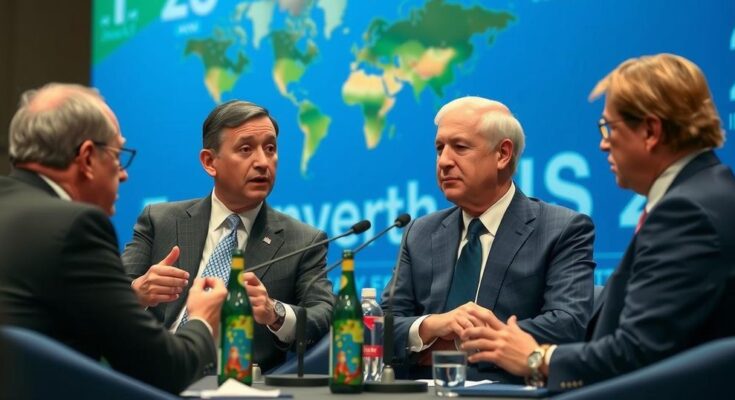At COP29 in Baku, leaders contended over climate strategies, as a report revealed a need for net-zero CO2 emissions by the late 2030s to meet Paris Agreement goals. The discussions highlighted a divide between fossil fuel advocates and those from vulnerable nations urging rapid action. A draft financial agreement was released, but disagreements on funding commitments continue, emphasizing the complications in global climate negotiations.
At the recent COP29 climate talks in Baku, global leaders presented conflicting strategies for addressing climate change, amid alarming new findings indicating that carbon dioxide emissions have reached unprecedented levels this year. A report from the Global Carbon Project indicates that to comply with the Paris Agreement’s goal of limiting temperature increases to 1.5ºC, net-zero CO2 emissions must be achieved by the late 2030s rather than the previously established target of 2050. Azerbaijan’s chief negotiator, Yalchin Rafiyev, emphasized the urgency of the matter, stating that “the time window is narrowing” and urging immediate action to maintain the possibility of limiting global warming. The discussions were marked by dramatic contrasts, as some leaders advocated for the continued use of fossil fuels, while others, particularly representatives from nations facing severe climate repercussions, insisted that prompt action is imperative. Albanian Prime Minister Edi Rama expressed frustration, declaring that empty promises do not suffice, while leaders like Italian Prime Minister Giorgia Meloni called for a more realistic approach that balances environmental goals with economic sustainability. As these conversations unfolded, negotiators issued a new draft financial agreement aimed at enhancing funding for developing nations. However, significant disagreements remain, particularly regarding the amount of annual commitment needed from wealthier countries. Prime Minister Philip Davis of the Bahamas pointed out the disparity between the resources mobilized for wars and pandemics compared to those for climate crises, questioning the commitment to addressing this urgent global challenge.
The article discusses the proceedings of COP29, an important conference focused on international climate agreements and actions. The urgency of achieving carbon neutrality was underscored by increasing emissions levels and stark warnings from environmental scientists. The ongoing disagreements among leaders on how to tackle climate change, particularly regarding the role of fossil fuels and financial commitments from developed nations to support adapting and transitioning efforts in developing countries, emphasize the complexity of global climate negotiations.
The COP29 talks revealed significant divisions among global leaders concerning the approach to climate change, with escalating emissions creating an urgent call for action. The contrasting positions on fossil fuel reliance versus immediate transition to clean energy reflect the challenging dynamics of achieving a united global strategy. As negotiations on climate finance continue, the need for substantial commitments from wealthier nations remains a pivotal point of discussion, underscoring the broader struggle for equitable climate action.
Original Source: jordantimes.com




